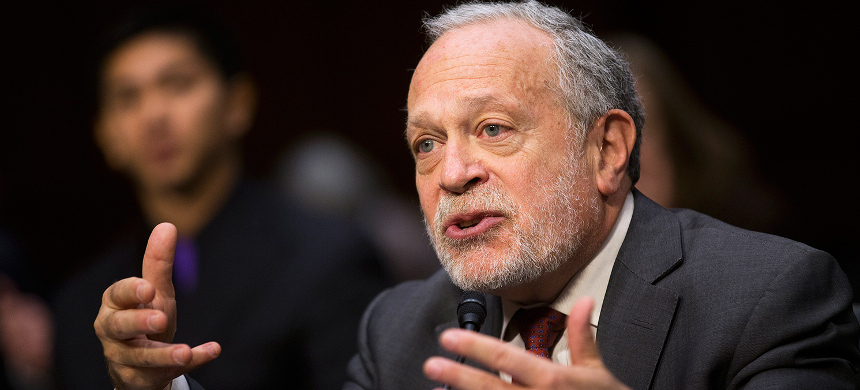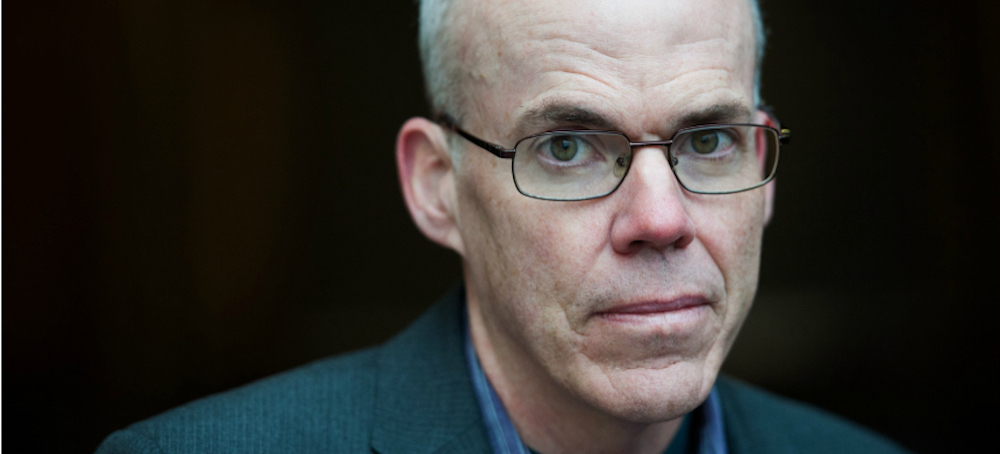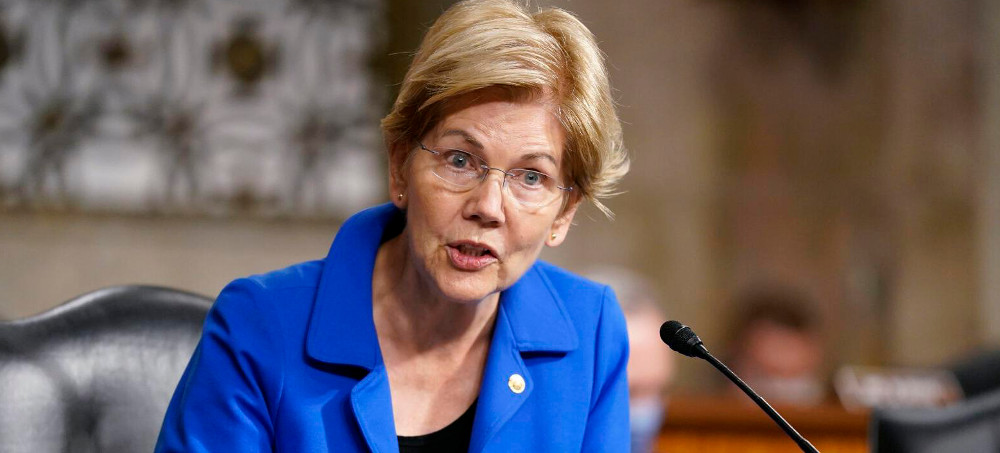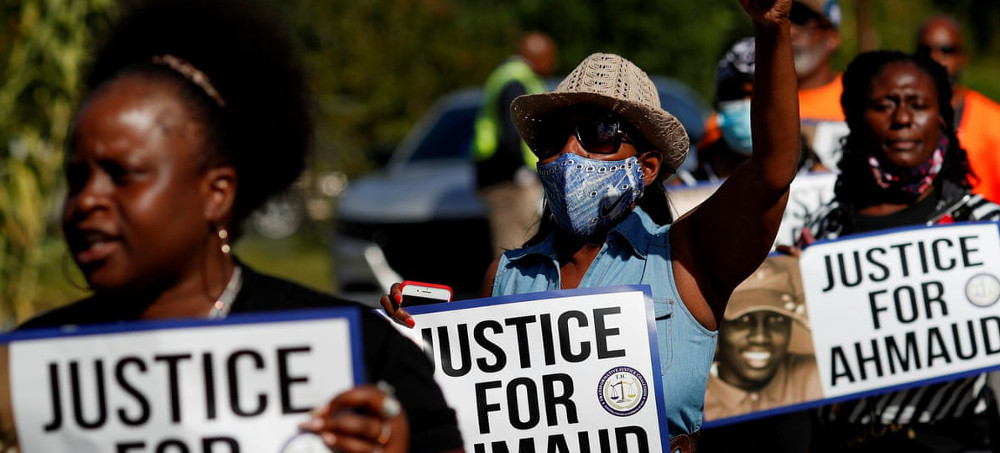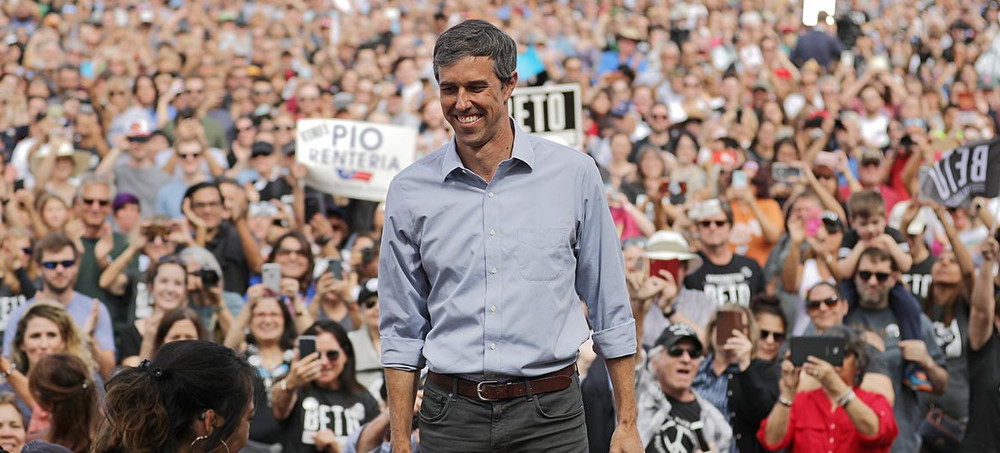Live on the homepage now!
Reader Supported News
How speculators making billions are intent on keeping crypto unregulated, unobserved, untaxed, and uncontrolled
The market for so-called crypto-currencies offers a case in point. Yesterday, the CEOs of six cryptocurrency companies testified before the House Financial Services Committee about the uses and abuses of crypto assets -- the first time crypto executives have addressed lawmakers. What will Congress do? Hmmm.
Crypto is no longer just a quirky means of financing illicit activities. It’s become a huge, unregulated gambling arena. And as it expands to include ever more of the portfolios of private-equity funds, hedge funds, mutual funds, venture capitalists and Wall Street banks, it’s fast becoming a political powerhouse as well.
What we’re seeing is a race between speculators who stand to gain billions by keeping the crypto arena unregulated, unobserved, untaxed, and uncontrolled -- and who are starting to spend huge sums to keep it that way – and those who stand to lose vast sums from the hackers, launderers, con artists, pump-and-dumpsters, Ponzi-schemers, and fraudsters now thriving in this murky underworld.
Crypto ransomware is exploding. The U.S. government recently traced crypto ransom paid by American corporations, hospitals, and city governments to a prestigious business address in Moscow.
In May, the Federal Trade Commission reported that consumers had lost more than $80 million on crypto scams between October 2020 and March 2021 -- more than ten times the amount lost during the same period the previous year, $2 million of which was lost to scammers impersonating Elon Musk. (As the Wall Street Journal reported, Musk “has become Bitcoin’s biggest influencer, like it or not.” In January, Musk added “#bitcoin” to his Twitter profile; in February, Tesla announced that it had bought $1.5 billion worth of bitcoin and would accept payment for its electronic vehicles in it. Tesla later reversed course on accepting bitcoin.)
I should add that simply in order to exist, cryptocurrencies use astonishing amounts of electricity. (The process of creating Bitcoin to spend or trade consumes around 91 terawatt-hours of electricity annually, more than is used by Finland, a nation of about 5.5 million.)
Crypto needs reining in. I wouldn’t ban it, but I’d do everything possible to protect small investors and consumers; prevent its use for money laundering, ransomware, and trafficking; and minimize (or force its users to pay for) the environmental costs of its gigantic energy demands.
Will any of this happen?
Consider that venture capitalists have invested more than $27 billion in crypto so far this year alone, more than the previous 10 years combined, according to PitchBook. Goldman Sachs is opening a cryptocurrency trading desk. Since February, BNY Mellon has allowed its clients to hold Bitcoin. Wells Fargo is planning to offer professionally managed cryptocurrency funds for qualified investors. Morgan Stanley’s Europe Opportunity Fund reports owning almost 30,000 shares of the Grayscale Bitcoin Trust, according to a June 28 filing.
This has created enough financial clout to forge a “crypto congressional complex” intent on keeping the game going. That complex has already attracted big-name players, including Brian Brooks, acting Comptroller of the Currency under Donald Trump and now chief executive of the blockchain technology company Bitfury Group; Jay Clayton, chair of the Securities and Exchange Commission under Trump and now an advisor to Fireblocks, a $2 billion Israeli-based crypto custodian; and Brian Quintenz, until September head of the Commodity Future Trading Commission’s Technology Committee, now adviser to Andreessen Horowitz, a venture-capital firm and investor in crypto startups. Andreessen Horowitz recent hires also include a former aide to Joe Biden and a former Justice Department crypto prosecutor.
Crypto campaign money is now flowing freely to members of Congress (some of it, presumably, in cryptocurrencies – but, who knows?) Congress’s “Blockchain Caucus” now counts 35 lawmakers as members. Cynthia Lummis, a Republican senator from Wyoming, has already raked in a significant portion of her 2026 campaign contributions from individuals linked to crypto firms. (In November she announced her opposition to Jerome Powell’s reappointment to head the Federal Reserve because of the central bank’s “political approach to digital assets.”)
Based on public disclosures, The Economist estimates that in the first nine months of this year, crypto firms spent some $5 million lobbying the U.S. Senate, about $2.5m of which was spent between July and September (four times the amount spent during the same period last year). The industry is now deploying the equivalent of 86 full-time lobbyists in Washington, up from just one in 2016. This is likely to be just the start.
Gary Gensler, current head of the Securities and Exchange Commission, says he wants tougher policing of the crypto “Wild West.” But so far the U.S. government hasn’t clarified whether cryptocurrencies are securities requiring heavy disclosures, or commodities whose exchanges are charged with preventing market manipulation. Crypto isn’t even currently reported on the forms hedge funds are required to file with the S.E.C., which list their ownership of stocks and bonds. This has left regulators in the dark.
All of which raises the question: As the crypto congressional complex continues to grow, how much longer will lawmakers and regulators be able to rein crypto in?
What do you think?
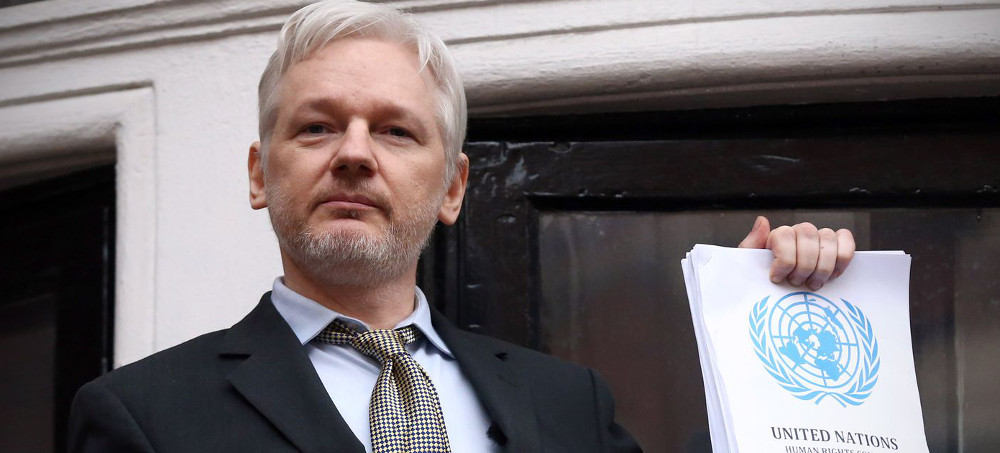 WikiLeaks founder Julian Assange holds in 2016 a U.N. arbitrary detention report on his case while speaking in London with the media. (photo: Niklas Halle'n/Getty)
WikiLeaks founder Julian Assange holds in 2016 a U.N. arbitrary detention report on his case while speaking in London with the media. (photo: Niklas Halle'n/Getty)
The 50-year-old Australian will remain in London’s Belmarsh prison, where he has been held since April 2019 after the Ecuadoran Embassy revoked his political asylum.
Stella Moris, Assange’s partner, mother of his two children and his former lawyer, said they will file a final appeal to the British Supreme Court, which would hear the case only if the court believes it involves a point of law “of general public importance.” That process could take weeks or months.
If the British Supreme Court court declines to hear Assange’s final appeal, he could seek a stay of extradition from the European Court of Human Rights — which Britain is still subject to — a substantial legal hurdle.
The High Court ruling on Friday brings Assange one step closer to being turned over to U.S. marshals for a flight to Washington, where he would stand trial in federal court in Northern Virginia.
U.S. prosecutors charge that Assange helped hack into classified information and published thousands of pages of military records and diplomatic cables about the wars in Afghanistan and Iraq, which put the lives of allies in danger.
Assange’s supporters say he was acting as an investigative journalist who uncovered a trove of damning material about American acts abroad. They say the extradition and prosecution will undermine press freedoms in the United States.
“How can it be fair, how can it be right, how can it be possible, to extradite Julian to the very country which plotted to kill him?” Moris said, in reference to a Yahoo News report that members of the Trump administration discussed kidnapping Assange or having him assassinated.
“We will appeal this decision at the earliest possible moment,” Moris said.
In January, a British judge ruled that Assange should not be extradited to the United States because he would be at high risk of suicide.
The U.S. government appealed that decision, suggesting the psychiatrist who examined him was biased and that Assange’s mental health was not a barrier to extradition.
Assange was charged under the Trump administration with violating the Espionage Act, the first time U.S. federal prosecutors have targeted not just the source but the publisher of classified information.
Chelsea Manning, the Army private who shared secret diplomatic and military information with WikiLeaks in 2010, was released from prison under President Barack Obama but spent roughly a year in jail for refusing to testify before a grand jury investigating Assange.
Under President Biden, the Justice Department assured the British courts that Assange can be put on trial in the United States despite his mental health issues.
If he were convicted, the U.S. government in October promised the British courts that Assange would not be sent to the country’s highest-security prison or automatically placed in solitary confinement. He could also seek to serve his sentence in his native Australia.
The British High Court sided with the Americans, and Judge Timothy Holroyde said the assurances offered over the conditions of Assange’s incarceration in the United States were both “sufficient” and “solemn undertakings,” promised from one government to another.
Assange’s defense attorneys maintained the U.S. assurances could not be trusted.
“It is highly disturbing that a U.K. court has overturned a decision not to extradite Julian Assange, accepting vague assurances by the United States government, which has reportedly plotted to kidnap or even assassinate Mr. Assange, that if Mr. Assange is extradited he will be provided appropriate care and not be held in a super-maximum facility,” U.S.-based defense attorney Barry Pollack said.
By the time he was charged in the United States under seal in 2017, Assange had already spent six years living in Ecuador’s London embassy out of fear that he would be extradited to Sweden for a sexual assault investigation and ultimately to the United States. The Ecuadoran government expelled him in 2019, and he was promptly arrested by British authorities.
The Justice Department began investigating Assange in 2010 but under Obama decided that any prosecution would create a dangerous precedent that could be used to go after news organizations. The Espionage Act has been used to prosecute government employees and contractors who share classified information with the press, but never before against the publisher of that information.
In their indictment of Assange, prosecutors took pains to distinguish him from traditional journalists, saying that he had encouraged illegal hacking and recording for personal reasons, and knowingly put people at risk by publishing their names.
“The Department takes seriously the role of journalists in our democracy,” then-Assistant Attorney General for National Security John Demers said at a press conference in 2019. “It is not and has never been the Department’s policy to target them for their reporting. Julian Assange is no journalist.”
Press freedom groups dismissed those distinctions as insufficient protection for journalists.
“We continue to have profound concerns about the press-freedom implications of this prosecution,” Jameel Jaffer, executive director at the Knight First Amendment Institute at Columbia University, said in a statement Friday. “The Trump administration should never have filed this indictment, and we call on the Biden administration again to withdraw it.”
The group Reporters Without Borders also condemned the decision that Assange can be extradited, saying he would face possible life imprisonment “for publishing information in the public interest.”
The group called for the U.S. government “to drop its more than decade-long case against him once and for all,” in line with its commitment to protect media freedom.
 Trump's January 6th Rally at the U.S. Capitol. (photo: Getty)
Trump's January 6th Rally at the U.S. Capitol. (photo: Getty)
However, the DC Circuit Court of Appeals paused its ruling for two weeks so that Trump could seek a Supreme Court intervention.
"The events of January 6th exposed the fragility of those democratic institutions and traditions that we had perhaps come to take for granted," said the DC Circuit opinion, which was written by Judge Patricia Millett, who was appointed by former President Barack Obama. "In response, the President of the United States and Congress have each made the judgment that access to this subset of presidential communication records is necessary to address a matter of great constitutional moment for the Republic. Former President Trump has given this court no legal reason to cast aside President Biden's assessment of the Executive Branch interests at stake, or to create a separation of powers conflict that the Political Branches have avoided."
Joining Millett in the decision was fellow Obama-appointee Judge Robert Wilkins and Judge Ketanji Brown Jackson, who was appointed to the appeals court by President Joe Biden.
Trump spokeswoman Liz Harrington said in a statement following the ruling that "regardless of today's decision by the appeals court, this case was always destined for the Supreme Court."
"President Trump's duty to defend the Constitution and the Office of the Presidency continues, and he will keep fighting for every American and every future Administration," she continued.
Committee Chair Bennie Thompson, a Mississippi Democrat, and Vice Chair Liz Cheney, a Wyoming Republican, issued a statement Thursday applauding, "the Court's decisive ruling, which respects the Select Committee's interest in obtaining White House records and the President's judgment in allowing those records to be produced."
"Our work moves ahead swiftly. We will get to the truth," the pair said.
House Speaker Nancy Pelosi, meanwhile, said in a statement Thursday, "No one can be allowed to stand in the way of the truth -- particularly not the previous President, who incited the insurrection."
Biden had declined to assert executive privilege over the documents in question, as he had determined that the "unique and extraordinary" circumstances around January 6 warranted the transparency, administration officials said.
Trump brought the lawsuit in October seeking to block the National Archives from turning over the documents to the House committee.
The former President's lawsuit alleged that the House's requests for documents from the executive branch "are unprecedented in their breadth and scope and are untethered from any legitimate legislative purpose." It also claimed that Biden's refusal to protect some of the documents was "a political ploy to accommodate his partisan allies."
Among several legal arguments made in court, Trump has claimed that the House select committee hasn't made clear the legislative reasons for why it needs records from his presidency, and that he should have some ability to keep private his discussions as president.
But the court pointed to several examples -- that spanned administrations and dated to the Reagan administration -- in which presidents "have agreed that the disclosure decision of an incumbent President controls within the Executive Branch over the contrary claim of a former President." The examples included regulations adopted by the National Archives under the Trump administration.
The court said it was stopping short of deciding whether the judicial branch could ever second-guess an incumbent president's decision not to assert executive privilege.
"Under any of the tests advocated by former President Trump, the profound interests in disclosure advanced by President Biden and the January 6th Committee far exceed his generalized concerns for Executive Branch confidentiality," the DC Circuit opinion said.
Notably, the court also backed the purpose of the House's investigation, as Trump had argued in the case that the probe lacked a legitimate legislative purpose.
"The very essence of the Article I power is legislating, and so there would seem to be few, if any, more imperative interests squarely within Congress's wheelhouse than ensuring the safe and uninterrupted conduct of its constitutionally assigned business," the opinion said.
"Here, the House of Representatives is investigating the single most deadly attack on the Capitol by domestic forces in the history of the United States. Lives were lost; blood was shed; portions of the Capitol building were badly damaged; and the lives of members of the House and Senate, as well as aides, staffers, and others who were working in the building, were endangered. They were forced to flee, preventing the legislators from completing their constitutional duties until the next day. "
The case turned on how courts should handle situations where a former president is seeking to overrule the decision by an incumbent president not to assert executive privilege.
"What Mr. Trump seeks is to have an Article III court intervene and nullify those judgments of the President and Congress, delay the Committee's work, and derail the negotiations and accommodations that the Political Branches have made," the appeals court said. "But essential to the rule of law is the principle that a former President must meet the same legal standards for obtaining preliminary injunctive relief as everyone else. And former President Trump has failed that task."
The National Archives was originally set to begin turning over records last month to Congress, but Trump's lawsuit had put that on hold, potentially slowing parts of the House committee's investigation.
The House said it needs the more than 700 pages of disputed Trump White House records -- including records from close advisers such as then-chief of staff Mark Meadows and press secretary Kayleigh McEnany -- so it can learn more about Trump's efforts in order for Congress to make laws that could protect future elections.
 Starbucks workers celebrated the outcome of the vote on Thursday in Buffalo. (photo: Lindsay Dedario/Reuters)
Starbucks workers celebrated the outcome of the vote on Thursday in Buffalo. (photo: Lindsay Dedario/Reuters)
Workers from one store in Buffalo, N.Y., voted to unionize, in a watershed moment for Starbucks, which operates 8,953 stores in the United States.
Three Buffalo-area stores held separate union elections. Baristas and shift supervisors from one store voted to unionize 19-8, while workers from the second store rejected unionization 12-8.
The third store failed to reach a verdict and faces a legal battle. There, 15 votes were cast for unionization and 9 against, while 7 votes were challenged. Most of the challenges came from the union, which argued that some workers who voted weren't regular employees at the location.
The election marks one of the highest-profile union wins for U.S. restaurant workers, which are among the least unionized in the country.
Starbucks workers who voted to unionize will join Workers United, affiliated with the massive Service Employees International Union.
3 more Buffalo stores and 1 in Arizona are also trying to unionize
Starbucks has promoted its reputation as a progressive employer with generous benefits, arguing that a union is not necessary.
In fact, Starbucks has fought off organizing attempts in New York City and Philadelphia. Decades earlier, in the 1980s, the United Food and Commercial Workers International Union for a while represented some Starbucks staff. That union still represents workers at some locations run by grocery stores and not directly by Starbucks.
Then, last year, workers at a corporate-run Starbucks store in Canada unionized. And now, three additional locations in the Buffalo area and one in Arizona are pursuing a union.
"I think a unionized Starbucks restaurant will demonstrate to workers ... that it's not easy, but they can do it," said Rebecca Givan, a labor studies professor at Rutgers University. "We will likely see many, many more organizing drives."
In a Thursday letter to staff shared with NPR, Starbucks North America President Rossann Williams said for now, the union results entail "no immediate changes."
"The vote outcomes will not change our shared purpose or how we will show up for each other," she wrote. "We want to protect partner flexibility, transferability and benefits across all stores in a market or a district because we know that's important to partners."
Buffalo workers get nationwide attention
The Buffalo vote garnered nationwide attention and support from key labor figures such as Sen. Bernie Sanders, I-Vt. Starbucks headquarters also responded to the drive by flying a wave of corporate executives into Buffalo, including the Williams and also legendary former CEO Howard Schultz.
The pro-union Starbucks workers advocated for better staffing, training and pay, including steady wage increases for workers who stay with the company for years only to discover their pay is not much more than that of new hires.
Hours before federal officials set the union vote for Buffalo stores, Starbucks announced it would raise its starting pay to $15 an hour and boost wages for staff employed longer than two and five years, plus make changes to its training and scheduling.
Buffalo workers later accused Starbucks of breaking the law by interfering with their labor organizing. They filed a federal labor charge, saying the chain was "engaging in a campaign of threats, intimidation, surveillance" and other illegal activity in response to their efforts to unionize.
Starbucks denied those allegations and said it complies with all labor-organizing laws and guidelines.
Starbucks had also argued that all 20 stores in the Buffalo area should vote in the union election, rather than three individual stores, noting that workers can pick up shifts at different stores. Federal labor officials repeatedly disagreed, finding each store to be fairly autonomous and declining to delay the election or the vote count over the matter.
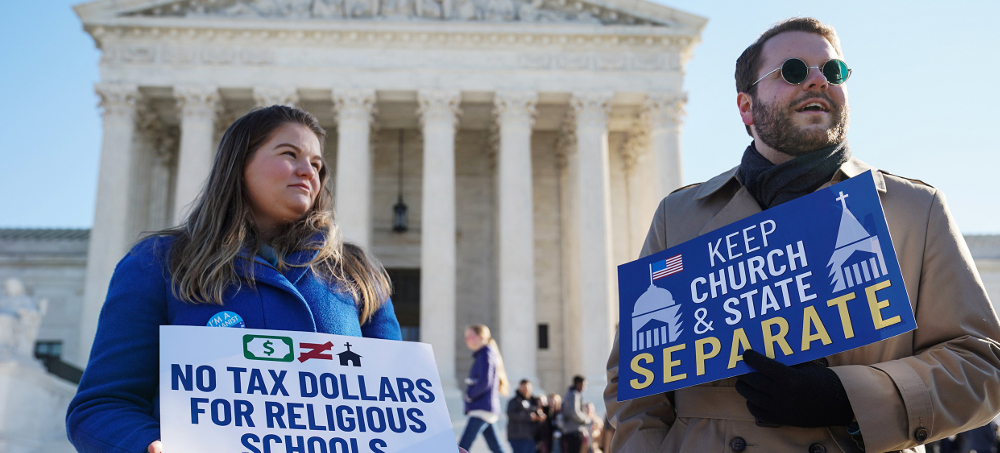 People gather outside the Supreme Court building as the court hears oral arguments in the Espinoza v. Montana Department of Revenue case, Jan. 22, 2020. (photo: Sarah Silbiger/Reuters)
People gather outside the Supreme Court building as the court hears oral arguments in the Espinoza v. Montana Department of Revenue case, Jan. 22, 2020. (photo: Sarah Silbiger/Reuters)
The handwriting on the wall came during a nearly two-hour argument involving a challenge brought by two Maine families to the state's unusual way of providing public education.
Maine is a state so rural that a majority of its school districts do not have a high school. The way the state has dealt with that problem is to contract with existing high schools to accept students from districts with no high school and, in addition, to pay the same amount to nonsectarian private schools to pick up the slack. What the state will not do is pay the same tuition for students attending religious schools.
School-choice advocates have long sought ways to promote equal treatment for religious schools with taxpayer funds, and they had a willing audience in the court's six conservatives, five of whom attended religious schools. All signaled that they too view Maine's refusal to fund religious schools as unconstitutional.
The court's liberals noted that in the past, the court has held that states may, if they wish, have voucher programs that allow parents to send their kids to religious schools, but that in this case, school-choice advocates are asking the court to contend that the state must treat religious schools the same way it treats nonsectarian private schools.
Justice Stephen Breyer suggested that the beliefs taught in a religious school seem to conflict with the state's human rights law: "No gay students, no gay teachers, the man is superior to the woman, and a few other things like that."
Justice Sonia Sotomayor said that the existing Maine program treats everyone equally. The state provides a free public secular education for everyone, and if a family wants something different, namely a religious education, the family — not the taxpayers — has to pay for it.
But that's definitely not the way the court's conservatives saw things.
Justice Clarence Thomas asked Maine Deputy Attorney General Christopher Taub for his definition of a public education. His answer: an education that doesn't prefer one religion over another and doesn't teach "through the lens of religion."
Chief Justice John Roberts also weighed in: "Let's suppose you have two schools. School A is run by a religion ... and that religion has a doctrine that they should provide service to their neighbors. ... Religion B has a school, but its doctrine requires adherents to educate children in the faith. ... Would the first school get the funds?"
Taub said, "Yes." And would the second? "No."
So, shot back Roberts, "You're discriminating against religions based on their belief."
Justice Neil Gorsuch pursued the point, asking, "How does that not discriminate against minority religious viewpoints ... and favor religions that are more watered down?"
Taub replied that under Maine's program, no school that instills religious beliefs is eligible for tuition payments from the state.
The hypotheticals continued. Would the state pay tuition for a school that taught white supremacy? No, said Taub, the school has to provide an education roughly equal to that in public schools.
What about a school that teaches "critical race theory?" asked Justice Samuel Alito. Taub replied that he wouldn't know how to define that. But he failed to note that starting in 2022, the state will require all private schools that get tuition payments from the state to use the same curriculum as the state.
Justice Elena Kagan, coming to the rescue, asked what has been the hardest case the state has "actually had."
Taub replied that there had not been any, because the religious schools that had asked about eligibility had all identified themselves as religious and as teaching through the lens of religion.
Justice Brett Kavanaugh repeatedly suggested that both religious and non-religious schools should be treated the same way. "Discriminating against all religions versus secular is itself a kind of discrimination that the court has said is odious to the Constitution," he observed.
What about a school that is anti-religion, he asked. Would that school be eligible for state tuition payments? Taub replied that he'd never heard of such a school in Maine, but that it would not be eligible because Maine's goal is to advance religious neutrality, rather than be pro-religion or anti-religion.
Justice Amy Coney Barrett followed up, asking how the government would even find out whether a school was teaching that all religions are "bigoted and biased."
Taub replied that over 99.8% of children in Maine go to either a public school or one of the so-called "big 11" nonsectarian private schools. The state's Department of Education is "very familiar with the curriculum" at those nonsectarian schools, he said, because they are 95% publicly funded through the tuition program.
 Saudi women's rights activist Loujain al-Hathloul is seen in this undated handout picture. (photo: Getty)
Saudi women's rights activist Loujain al-Hathloul is seen in this undated handout picture. (photo: Getty)
Loujain al-Hathloul helped lead a campaign to allow Saudi Arabian women to drive by live-streaming herself violating the ban, which was lifted in 2018.
She spent almost three years in Saudi jails and is currently banned from leaving the Kingdom. The lawsuit was filed on her behalf on Thursday in a federal court in Oregon by the privacy non-profit organization Electronic Frontier Foundation.
It alleged that the surveillance operation run by the three ex-contractors and DarkMatter, a United Arab Emirates cybersecurity company, led to al-Hathloul's arrest by the UAE’s security services.
From there she was extradited by private plane to Saudi Arabia, "where she was detained, imprisoned and tortured," according to the lawsuit.
A 2019 Reuters investigation cited by the lawsuit, revealed that al-Hathloul was targeted in 2017 by a team of U.S. mercenaries who surveilled dissidents on behalf of the UAE under a program called Project Raven, which categorized her as a national security threat and hacked into her iPhone.
Al-Hathloul said that as she was tortured, interrogators mentioned communications they apparently learned of through "unlawful access" to her phone, according to the lawsuit.
Saudi officials have denied torturing al-Hathloul and say she received a fair trial. A request for comment to the Saudi and Emirati embassies in Washington was not immediately answered.
In a separate settlement with U.S. federal prosecutors in September, for hacking charges, the three former U.S. intelligence contractors Marc Baier, Ryan Adams, and Daniel Gericke admitted to conducting surveillance operations on behalf of the UAE, including breaking into mobile devices.
Requests for comment sent to representatives for Gericke, Baier, Adams and DarkMatter were not immediately answered.
"No government or individual should tolerate the misuse of spy malware to deter human rights," al-Hathloul said in a statement.
"This is why I have chosen to stand up for our collective right to remain safe online and limit government-backed cyber abuses of power. ”
 'Secondary forests are like teenagers,' said study lead Lourens Poorter. 'They soak up carbon like crazy and they empty your fridge.' (photo: Igor Dudkovskiy/AP)
'Secondary forests are like teenagers,' said study lead Lourens Poorter. 'They soak up carbon like crazy and they empty your fridge.' (photo: Igor Dudkovskiy/AP)
Study finds natural regrowth yields better results than human plantings and offers hope for climate recovery
An international group of researchers has found that tropical forests have the potential to almost fully regrow if they are left untouched by humans for about 20 years. This is due to a multidimensional mechanism whereby old forest flora and fauna help a new generation of forest grow – a natural process known as “secondary succession”.
These new findings, published in Science, could play an important role in climate-breakdown mitigation and provide actionable advice on how to act next. They also suggest that it is not too late to undo the damage that humanity has done through catastrophic climate change over the last few decades.
“That’s good news, because the implication is that, 20 years … that’s a realistic time that I can think of, and that my daughter can think of, and that the policymakers can think of,” said Lourens Poorter, professor in functional ecology at Wageningen University in the Netherlands and lead author of the paper.
This idea of natural regeneration is frequently disregarded in favour of tree plantations, but according to Poorter, the former yields better results than restoration plantings. “Compared to planting new trees, it performs way better in terms of biodiversity, climate change mitigation and recovering nutrients.”
The takeaway message is that we don’t necessarily need to plant more trees when nature is doing it by itself, Poorter said.
For this study, more than 90 researchers from all over the world came together to analyse exactly how tropical forest regrowth takes place. They pored over data about forest recovery from three continents, 77 sites and 2,275 plots of land in the Americas and West Africa. From there, they evaluated 12 specific criteria, such as the soil, plant functioning, ecosystem structure and biodiversity, and more. They then modelled this data – without which they would have had to wait for over 100 years to see this happen in the real world – with a technique called chronosequencing, allowing them to infer long-term trends in forest recovery.
The researchers looked in particular at what happens to tropical forest land that has been used for agriculture or farming and is then abandoned after a couple of seasons. They found that the old forest portion – including some fertile soil, any residual trees, seed banks and maybe stumps that can resprout – created a nourishing, interconnected ecosystem for new forest to start to grow.
The researchers found that different aspects take, respectively, more or less time to recover to the levels of “old forest” before it was used. Soil takes an average of 10 years to recover to its previous status, plant community and animal biodiversity take 60 years, and overall biomass takes a total of 120, according to their calculations.
But overall, tropical forests can get back to roughly 78% of their old-growth status in just 20 years. “That’s tremendously fast – surprisingly fast,” Poorter said.
Of course, these are just calculations, and one of the constraints of chronosequence-based analyses is that every location analysed is assumed to have the same history and successional dynamics, said Eric Salas, a researcher in geospatial sciences at Central State University who was not involved in this study. So there can be some misinterpretation.
“But understanding how secondary forests emerge naturally on abandoned agricultural lands is critical for ensuring biodiversity conservation,” Salas said, “particularly in tropical settings, where forests have complex structure and flora and fauna species are diverse.”
The findings could be crucial for climate mitigation action in the future.
“For example, the secondary forests are like teenagers. They soak up carbon like crazy and they empty your fridge,” Poorter said. “If you look at old people, they consume very little, and it’s the same as the old growth forest.”
“What we want to advocate is: ‘Please value those secondary forests, and in areas where you can, please let those forests regrow back again naturally,” Poorter said. He mentions that a lot of the promises that have been made about planting trees in order to restore forests across the world are unrealistic. Most of the time, 30%-50% of those trees die, and they only pertain to a couple of species that cannot mimic the natural biodiversity of forests, according to Poorter.
“My plea is to use natural regrowth where you can and plant actively and restore actively where you need to. There’s a case-by-case approach, and this all depends on the local conditions and also on the local needs of the people because they live in these landscapes.”
Follow us on facebook and twitter!
PO Box 2043 / Citrus Heights, CA 95611

